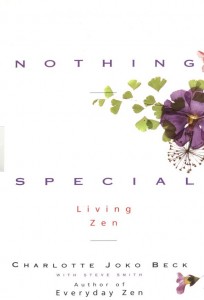“By far the most difficult jump to make is from stage one to stage two. We must first become aware of our emotional reactions and our body tension, how we carry on about everything in our lives, even if we conceal our reactions. . . . . We resist doing this work because it begins to tear apart who we think we are.”
– Joko Beck
Practice Meetings
Tuesday Apr. 3, 8:30am
Friday Apr. 6. 7:00pm
This Week’s Reading
Charlotte Joko Beck, Nothing Special, “The Six Stages of Practice,” p. 187.
This Week’s Koan
Book of Serenity, #12: Dizang Plants the Rice Field
Dizang asked Longji, “Where have you come from?”
Longji said, “I have come from the South.”
Dizang said, “How is Buddhism in the South these days?”
Longji said, “There is much lively discussion.”
Dizang said, “How could that match with our planting the rice field here and making rice-balls to eat?”
Longji said, “How could you then save the beings of the Three Worlds?”
Dizang said, “What do you call ‘the Three Worlds’?”
Comment:
Dizang (“Jizo” in Japanese), b. 868
14th Generation
Lineage: Shitou > Tianhuang > Longtan > Deshan > Xuefeng > Xuansha > Dizang
Dharma Siblings: None of record.
Appears also in: Book of Serenity #20
From Andy Ferguson, Zen’s Chinese History:
Classical records say that from early childhood he [Dizang] could speak very well and would not eat meat. He was ordained at Wansui Temple, located in his home province, under a teacher name Wuxiang. At first he closely followed the teachings of the Vinaya, but later declared that just guarding against breaking the vows and adhering to the precepts did not equal true renunciation. He then set off to explore the teachings of the Zen school. Dizang first studied withe Xuefeng, but was unsuccessful at penetrating the Way. It was Xuefeng’s disciple, Xuansha, who is said to have brought Dizang to full awakening.
